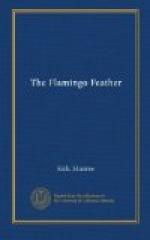Had the guards been awake instead of dreaming, it is possible that they might have noticed the dark figure of a man who noiselessly and stealthily crept amid the heavy shadows on the edge of the forest towards the great granary, or storehouse, in which was kept all the ripe maize of the tribe, together with much starch-root (koonti katki) and a large quantity of yams. The granary was built of pitch-pine posts and poles, heavily thatched with palm-leaves, that the summer suns had dried to a tinder.
Occasionally the dark figure skulking among the shadows came to little patches of bright moonlight, and to cross these he lay flat on the ground and writhed his way through the grass like a snake. A close observer would have noticed a dull, steady glow which came from a round object that the skulker carried with great care. If he had been near enough he would have seen that this was a large gourd, in which, on a bed of sand, were a quantity of live coals taken from one of the fires that still smouldered about the epola, or place of dancing. In his other hand the man carried a few fat-pine splinters that would burn almost like gun-powder.
At length, without having attracted attention from any one of the encamped Indians, or the drowsy guards upon whom they depended for safety, the figure reached the granary, and disappeared amid the dark shadows of its walls. Crouching to the ground, and screening his gourd of coals with his robe, he thrust into it one end of the bundle of fat-pine splinters and blew gently upon them. They smoked for a minute, and then burst into a quick blaze.
Beginning at one end of the granary, this torch was applied to the dry thatch that covered it, and it instantly sprang into flame. As the figure ran along the end of the structure, around the corner, and down the entire length of its side, always keeping in the shadow, he applied the torch in a dozen places, and then flinging it on top of the low roof, where it speedily ignited the covering, he bounded away into the darkness, uttering, as he did so, a long-drawn, ear-piercing yell of triumph.
By the time the nodding guards had discovered the flames and given the alarm, the whole granary was in a blaze, and the startled Indians, who rushed out from the lodges and palmetto booths, could do nothing but stand helpless and gaze at the destruction of their property. All asked how it had happened, and who had done this thing, but not even the guards could offer the slightest explanation.
Meantime the author of all this mischief stopped when he had gained what he considered a safe distance from the fire, and, concealed by the friendly shadows of the forest, stood with folded arms and scowling features gazing at the result of his efforts. At length the light from the burning building grew so bright that even the shadow in which he stood began to be illuminated, and he turned to go away. As he did so he shook his clenched hand towards the burning granary, and muttered, “The white man and the red man shall both learn to dread the fangs of the Snake, for thus do I declare war against them both.”




